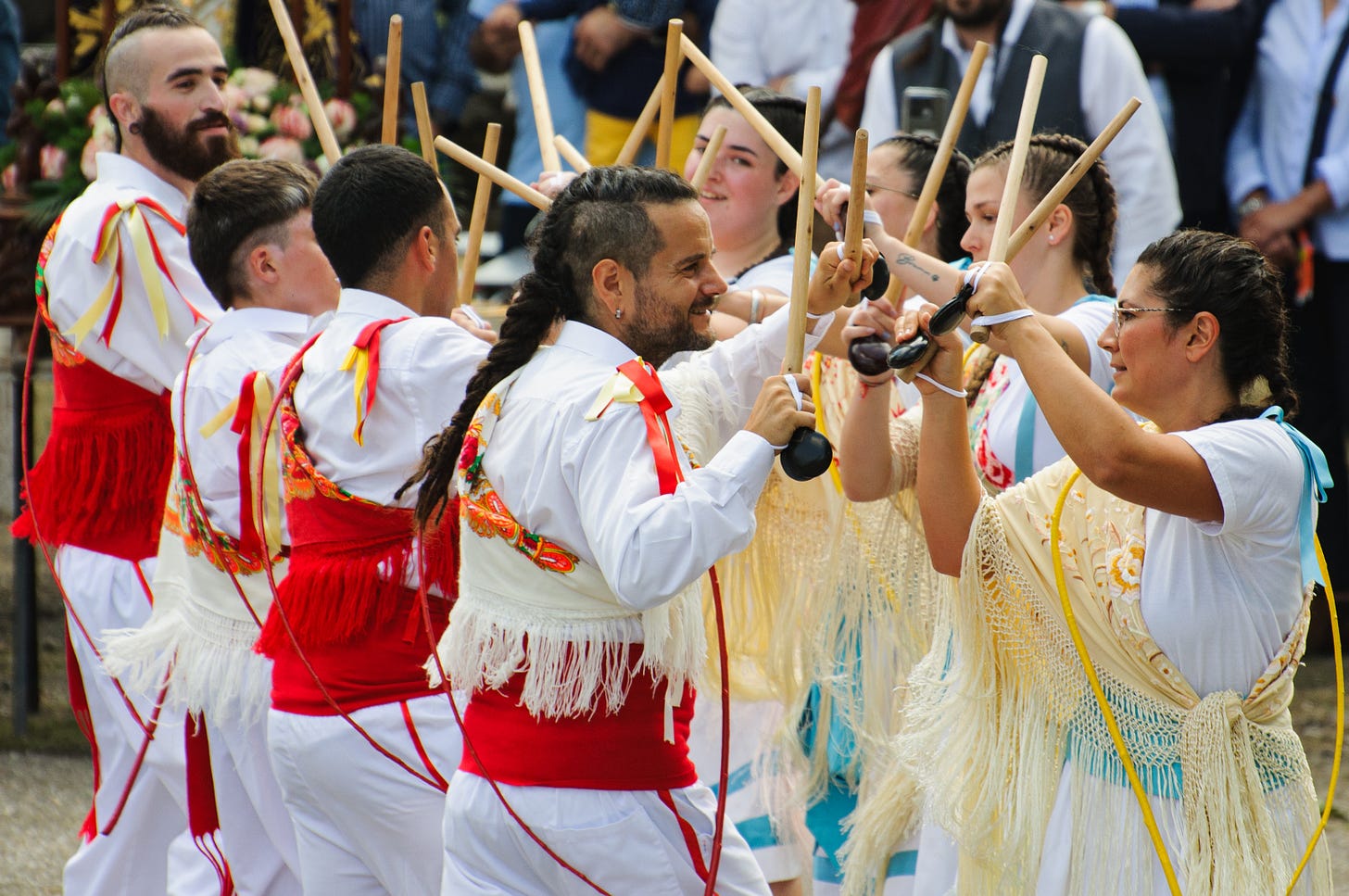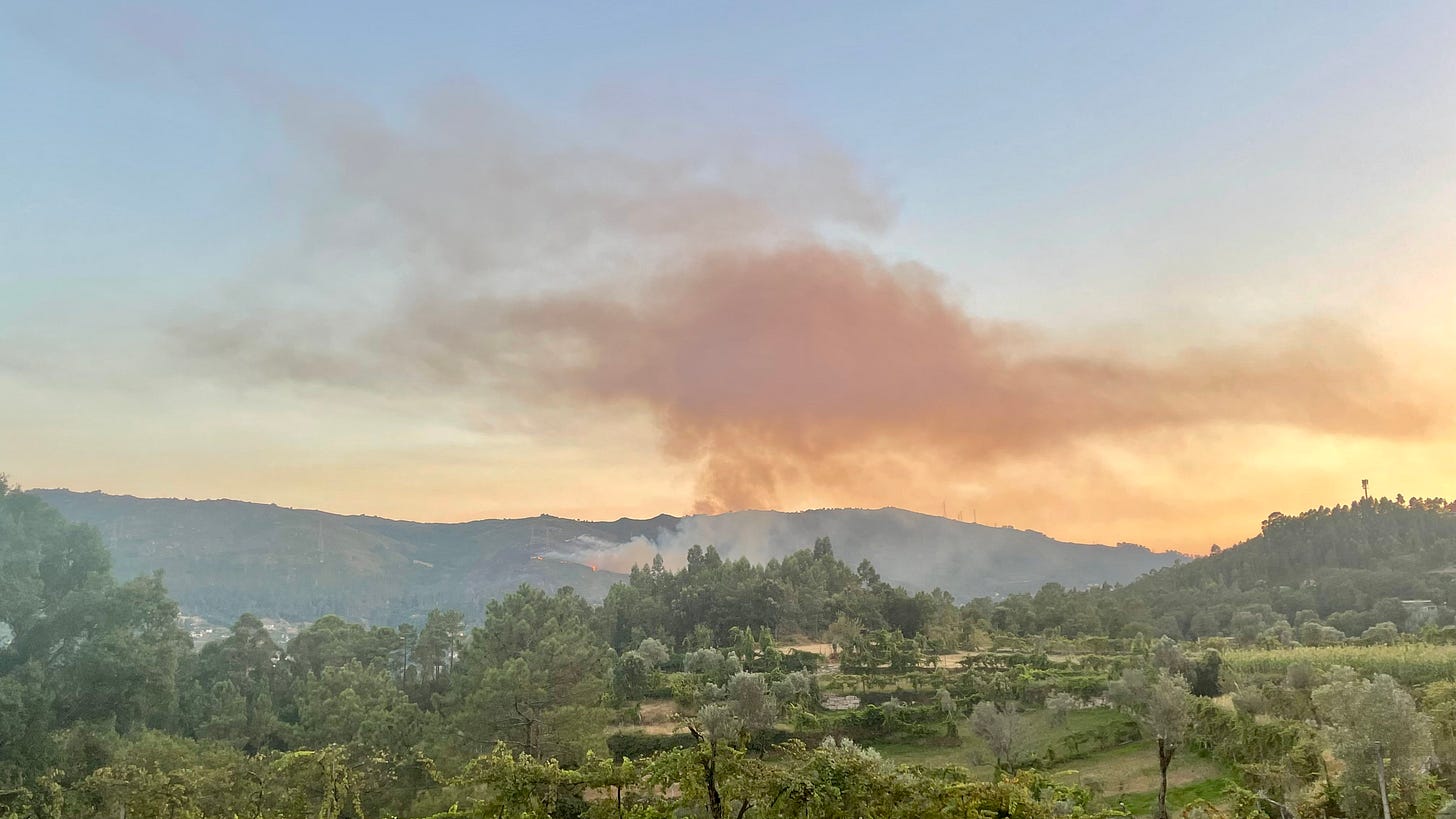Regenerating cultures and landscapes
Big change in a small village
I spent August and September in Galicia, Spain’s northwestern region. With this post, I want to integrate and share some of my experiences there.
“The knowledge that results from recognition, then, is not of the same kind as the discovery of something new: it arises rather from a renewed reckoning with a potentiality that lies within oneself.” – Amitav Ghosh, The Great Derangement.
Environmental talk, especially about climate change, often fixates on ‘pathways’: transitions with an origin and a destination. Along these pathways, new tools and technologies emerge and are put to use.
The social world, by contrast, contains practices and perspectives. Often, those that we will need in the future have already been around for a long time. Insight lies in recognising what works, understanding how to protect it, and perhaps using new tools to help.
Looking back and moving forwards
The past never feels far away in Galicia. The region has Celtic blood and influences – a heritage both seen and heard, in language, stories, traditional dance, and historic settlements. Many locals know and sing along to folk music played with tambourines, accordions, and a variety of the bagpipes (gaitas).
Yet while the coastline and the Camino to Santiago swell with tourists, in many rural areas local life is at more risk of fading away than being crushed. Hillside villages dotted with mossy ruins attest to Spain’s problem with rural depopulation.
In response, an experiment is taking place in the south-western village of Anceu, driven by Anceu Coliving and its affiliated NGO, Rural Hackers. I have mentioned coliving before. It is popular among digital nomads and other slow travellers seeking community, including artists and volunteers.
Rural Hackers brings this flow of people and ideas into dialogue with the local community, mediated by art and technology.
At first, I found the concept quite abstract. But after meeting people and seeing things in their context, it grew more and more compelling. Locals and visitors have collaborated to produce artworks on forest paths and communal buildings, record and share local stories through digital installations, and revive the community centre as a hub for village life.
Communities of the forest
Heritage and identity are bound up with people’s attachment to land and nature.
In Galicia, a practice of communal land holding (montes vecinales en mano común) has existed since before recorded memory. These are called ‘forest communities’ or ‘associations’. There are some 3000 in the region and a further 1500 in Portugal, according to the documentary En Todas As Mans (‘In Everyone’s Hands’).
Every local household has one member, each with an equal voice. In practice, this means electing a committee to steward the land in the collective, long-term interest. The land is not owned by members and it cannot be inherited or sold. Those who move away lose their right; new residents are invited to join.
Forest communities support rural life, although they have changed greatly over the years. In agrarian, self-sufficient times, families farmed more of the land and made direct use of the forest’s resources. For example: gorse bush, which today scratches my legs when I go hiking, was once mixed with animal dung to serve as fertiliser. Modern forest associations reinvest 40 percent of their income into community benefits.
The communities have had to fight to defend their rights. The Franco regime pushed locals off their lands to plant trees for timber and paper production. Legal recognition came decades later, as the dictatorship withered and Spain transitioned to democracy.
Yet the whiff of intervention in the forests can still be detected. Corporations often lease communal land, and they drive a hard bargain. Some build large factories for paper pulp; others, wind turbines. In En Todas As Mans, one forest committee member describes how the meagre payments offered by energy companies won over many locals who didn’t know how much the land should be worth. “It divided us,” she says. If the wind farm had been community-owned, she adds, “young people would have stayed.”
Eucalyptus plantations, unexpectedly commonplace in Galicia, are another a crucial part of the story. Although considered invasive, local people have often planted the tree because it grows quickly and its wood makes for easy money. Currently, it is the only source of income for the forest association in Anceu.
Eucalyptus grows readily from its seeds, outpacing and crowding out native species. It is also tricky to remove, so monocultures quickly take root. Unsurprisingly, the big winner of oversupply is the paper industry. Worse still, eucalyptus fuels and thrives on fire.
One morning in September, after a week of unseasonably hot weather, I woke in the Coliving to the smell of smoke. The sun appeared as a burnt orange blot in a hazy sky, casting a warm light like a permanent sunset. Agustin, who runs the Coliving and sits on the forest committee, had assured us that the adjacent woods, rich with oak trees, would not burn.
It turned out that vast fires in Portugal were responsible for a cloud of dust that blanketed southern Galicia for two days, until the rain returned. Later, Victor, a former coliver who moved to the village, showed me photos he took of a small fire across the valley from Anceu which had flared up overnight, before it was successfully contained.
If a tree falls
Forest associations need to think and act long-term. Depopulation – and the economic concentration that drives it – threaten this.
In Anceu, knowledge of the forest and its contours lies with the current generation of elders. Camilo, president of the association, hopes more young people will get involved, and to inspire people to care. He wants the forest to be a source “not only of wood, but also experiences.”
Local pride in the environment is an asset that is too often left to degrade. Collective responsibility is a gift of communal life, but it demands commitment.
I hope that rural hacking can succeed and help to secure the future of the forests. There are already some signs. From time to time, colivers help with restoration activities, and some creators in residence have been studying and making use of local, native plants.
Yet perhaps the arrival of foreigners like me also raises a question: who is this land for?
After we spent a morning removing eucalyptus saplings near the village, Kiko, a coliver from Vigo who is involved in his local forest association, reflected: “it feels strange, to see people from abroad who seem to care more about our land than some people from my region do.”
Any tensions that might result seem surmountable – provided the cultural gap can be bridged, as Rural Hackers aims to do. Coliving, after all, asks us to work together and seek out what we have in common, rather than focusing on our differences.
Does it make a sound?
Listening to a night of Galician music provided by fellow colivers, I reflected on heritage in England, where I grew up.
The UK (and England especially) has a complicated and repressed relationship with its history. English folk culture feels remote and its traditions are often the preserve of the right-wing. We have also learned just how far the country’s natural ecosystems have been allowed to decline.
I see these as symptoms of the same cause: a naturalistic sense of self all but lost, ground down by centuries of empire and capital.
So, a moment for reflection:
What stories and practices are you aware of that your elders have passed down to you, or that have a home where you live?
What do they have to say about living with the land?
Where to go next
You can learn much more about Anceu and the characters in this story in the Rural Hackers Magazine, soon to be published. Cora Ashraf and Feli Döring are its creators: I owe them greatly for inspiration and for kindly sharing their interview with Camilo. I will include a link here when it is available and share it in my next post.
If you are a creative, check out this call for applications by Culture Moves Europe, which supports people to travel and work on their projects in another country. See the list of eligible countries here. Rural Hackers also has its own residencies.
Social patterns of landscape management are changing more broadly: take a look at this intriguing paper. It examines “de-eucalyptising brigades” first organised by civil society groups after massive fires in 2017. Activists from cities and towns have been participating alongside people from rural areas, both groups ranging in age from 16 up to 65 years old.




1. Love love love this sentence and why is the use of the word repressed so INCREDIBLY APT??????????? It feels meaningful on ALL THE LEVELS - stiff upper lip included -
Like if you’re rewarded for// if you’re not allowed to feel / express much of even your own emotions about ur own personal joys and pains - (now I’m picturing the crown lol but u get me) then WHAT HOPE IS THERE to engage with the scary scary scary feeling realms of facing how we oppress & the history & why it all matters that we can thread it all together?
2. English folk culture feels remote and its traditions are often the preserve of the right-wing.
I love this so much for many reasons cos it’s making me think & also the main thing is - isn’t it fucking interesting that I SWEAR everyone could potensh benefit from this in the sense that my personal immediate direction my mind went to was “I’d feel much better about everything cultural appropriation (looting?? Systematic looting in the present day?) -wise if there was more that people could lean into with this - and the things I will let trail off is that I randomly stumbled upon a Reddit thread that was all about denouncing the explicitly racist cooption of Scandinavian ancient culture and extremely (low bar yes but in the same way that it matters cos facing reality, I was pleasantly shocked to see this) - people fighting to say that it’s not just enough to say “that’s not us” but they need to root out the problem from within-
That was so so so so so so interesting unexpected and cool and basically thank you for all of this because OMG yes also the bit about land - !!!!!!!!!
No one gets to sell the land
No one gets to inherit the land
- that’s also something that’s just making me think so many things that I will trail off here too, internally and in this comment hehe xxxxxxxxxxxxxxx but incredible and fucking interesting the way this traversed and integrated topics I wouldn’t have 1) had a single iota of knowledge about 2) let alone had a reason to merge - ✨💖✨💖💖✨💖✨
TRAILING OFF NOW FOR REALS XXXXXX